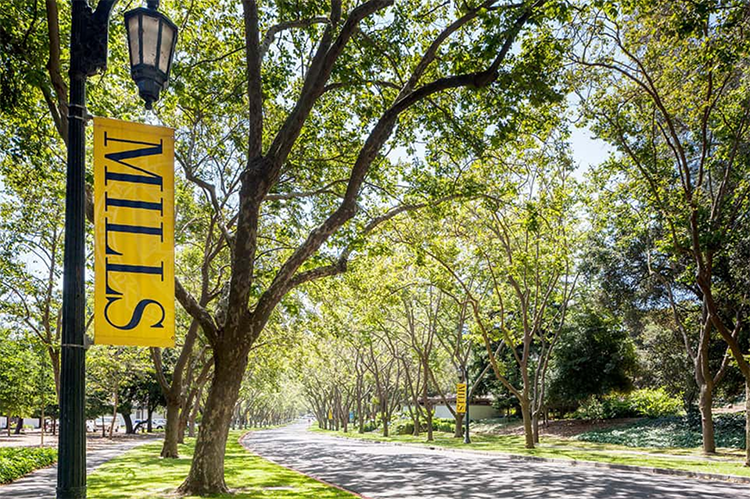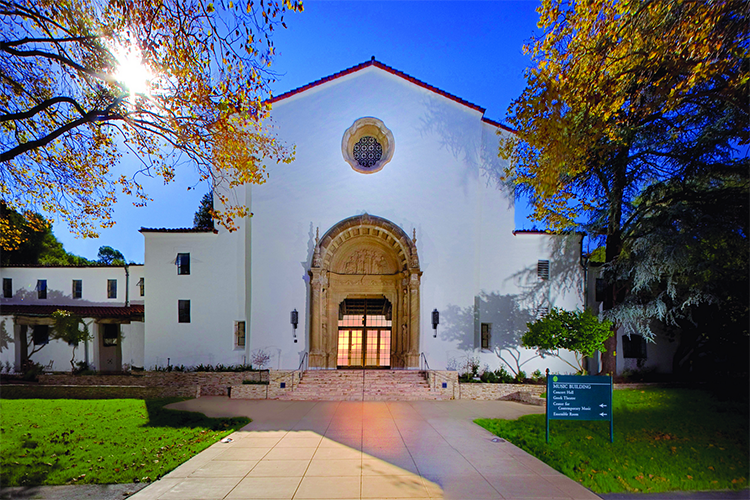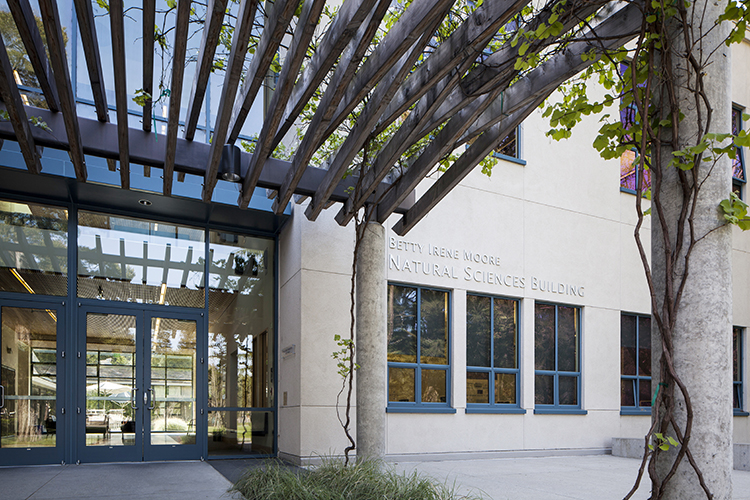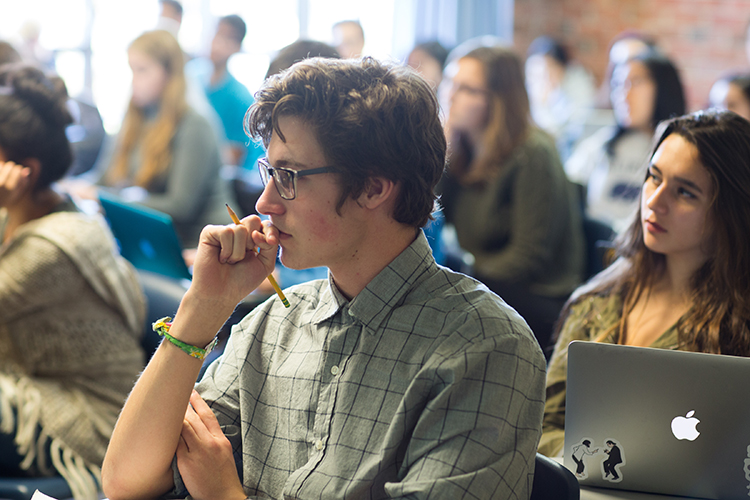Berkeley launches one-year residential program at Mills College
Smaller cohort, engagement with Oakland will be highlights of upcoming UC Berkeley Changemaker-Oakland program for 200 first-year Berkeley students
March 25, 2021

Mills College will be the site of UC Berkeley’s first one-year residential program for 200 first-year students starting in fall 2021. (Mills College photo by Phil Bond)
First-year students accepted to UC Berkeley for the 2021-22 academic year will have a new option for how — and where — to start their undergraduate experience.
In addition to the traditional path on the Berkeley campus, and the longstanding Fall Program for Freshmen (FPF), which since 1983 has offered a one-semester opportunity in Berkeley for about 750 incoming students to take core classes together, an additional pathway is being located on the Mills College campus in Oakland.
The UC Berkeley Changemaker-Oakland program, for 200 students, will be the only yearlong, first-year residential college experience offered by Berkeley.
The program also will benefit students whose transition to Berkeley’s main campus is helped by first spending time in a smaller cohort environment.
“We’re building on the Fall Program for Freshmen, and that program has a good legacy,” said Ramu Nagappan, assistant dean of UC Berkeley Extension, which runs FPF and also will operate the new program. The FPF is a small, collaborative learning community for incoming students in the College of Letters and Science that refers to itself as “like a small liberal arts college, with the resources and opportunities of a large research university.”

The new UC Berkeley Changemaker-Oakland program at Mills College is built off of Berkeley’s successful Fall Program for Freshmen, which launched in 1983. Both are small, collaborative learning communities of first-year students and are run by UC Berkeley Extension. (UC Berkeley Extension photo)
At the end of their FPF semester, said Nagappan, students demonstrate “small, but measurable differences in academic outcomes — their GPAs are slightly higher, their time to graduate is a little faster than College of Letters and Science students who start on the main campus. It’s more of a nurturing environment.”
Another fall program, Berkeley Global Edge in London, a one-semester international experience for newly admitted students, began in 2015, but was suspended in 2020, and will be suspended again in fall 2021 due to the coronavirus pandemic. The 2019 London cohort had 90 students.
Mills College has a current student body of just over 960; UC Berkeley Changemaker-Oakland will also be a small group — 150 incoming students from the College of Letters and Science and 50 from the Rausser College of Natural Resources.
Berkeley’s new program has an ideal location at Mills College, said Chinyere Oparah, provost and dean of the faculty at Mills.

Littlefield Concert Hall at Mills College, an independent liberal arts college founded in 1852 and the oldest undergraduate college for women in the West. (Mills College photo by Paul Kuroda)
“Oakland is a vibrant cultural hub and a community with a deep history of social activism, and Mills’ faculty and students see ourselves as being in partnership with Oakland — and, specifically, with educators, artists, practitioners, people doing real change work in the community.
“We work with a lot of nonprofit organizations, alongside women of color, people with HIV and AIDS, immigrant and human rights groups, Native American health and environmental justice organizations, local schools. We see ourselves in a relationship with Oakland — as a partner, not as an institution where we’re there to rescue or save anyone: We have as much to learn from the community as it does from us.”
Living and studying at Mills, Berkeley students will experience the “constant flow onto the Mills campus of local organizers, activists and policymakers” from Oakland, Oparah said. “We anticipate cocreating activities, shared events, with our working group of Berkeley faculty and programmers, with a vision around change-making.”
Koshland agreed that the intellectual strength of the Mills College community and the network it has built over time with Oakland’s artists, activists and educators “will add to the richness of Berkeley students’ experience in this new residential program.”
Earlier this month, Mills announced it will stop enrolling new first-year undergraduates after fall 2021 due to the economic pressures facing many small, independent colleges. It plans to build degree pathways for its current students and to create an institute on campus to continue its mission to foster women’s leadership and to advance gender and racial equity.

The approximately 750 students in the campus’s Fall Program for Freshmen appreciate spending time in a small-cohort environment before transitioning to Berkeley’s main campus. There will be 200 students in the UC Berkeley Changemaker-Oakland program. (UC Berkeley Extension photo)
A history of reciprocity between schools
Unlike FPF, UC Berkeley Changemaker-Oakland will be residential, with Berkeley students living in Mills College residence halls in single occupancy rooms; they also can choose to have a Berkeley roommate. They will have their own instructors with academic appointments through UC Berkeley Extension, each vetted by Berkeley academic departments and the Academic Senate. The students’ academic adviser will be from the Berkeley campus.
If they wish, the first-year Berkeley`students at Mills can take one course on the Berkeley campus each semester. For decades, Berkeley has had a cross-registration agreement with Mills College that allows all Berkeley students who are self-identified women or gender nonbinary to take one course per semester at Mills; Mills students can take one course at Berkeley. A free Mills College shuttle service runs between Mills, BART and Berkeley.
The new Berkeley program at Mills is open to all first-year Berkeley students, not just self-identified women or people who are gender nonbinary.
Berkeley also has had Mills Fast Track Business Programs that allow Berkeley students and alumni to earn a Master of Management degree from Mills in as little as one semester or a Master of Business Administration in as little as two semesters.

The UC Berkeley Changemaker-Oakland program will be built on the campus’s “Berkeley Changemaker” values of questioning the status quo and serving the community. (UC Berkeley Extension photo)
Mills, founded in 1852, is an independent liberal arts college that offers bachelor’s degrees to women and gender nonbinary students and is the oldest undergraduate college for women in the West. It offers graduate degrees and certificates to all genders.
Mills’ student body is very diverse: Of the incoming 2020 class of undergraduates, for example, 65% were students of color, 58% were LGBTQ, 44% were first-generation college students and 17% were “resumer” students, ages 23 or older.
“Our demographics are only increasing,” said Oparah of the school’s profile. “Berkeley students can enjoy and learn from the deep commitment to equity and gender justice that we have on the Mills campus. That might make some of the incoming (Berkeley) students feel they’ve found a home, that they fit right in.”
Program to benefit students and Berkeley campus
Berkeley has been in conversation with Mills College on a plan for a program on the Mills campus, in part because it would enable Berkeley to enroll more students when it doesn’t have room for them on the main campus, said Rick Russo, Berkeley’s associate vice chancellor for undergraduate education and dean of Summer Sessions, Study Abroad and Lifelong Learning.
“Even with the Fall Program for Freshmen and Global Edge London, we still are overrun in our freshman gateway courses, and there just aren’t enough classrooms; London came up to create more capacity for freshmen,” he said. “By creating this cohort program at Mills, we will be able to educate 200 freshmen for a year, without overtaxing the main campus. The impact is lighter for sophomore year.”
The FPF program was created in the ‘80s, when Berkeley offered spring semester admission to a group of students who were filling seats that otherwise would be empty because some students leave after fall semester and others graduate. These so-called spring admits “needed an academic home” in the fall, said Nagappan, “so Extension created FPF.”

The Betty Irene Moore Natural Sciences Building at Mills College, which offers undergraduate degrees to women and gender nonbinary students and graduate degrees and certificates to students of all genders. (Mills College photo by Phil Bond)
The number of spring admits grew until 2015, when the Office of Undergraduate Admissions did away with the policy and instituted a waitlist to manage enrollment. Starting in fall 2015, all FPF students became regular fall admits, but the program was retained because it provided a solid foundation for students who felt they needed a bridge to the traditional path on campus.
Russo added that the new program at Mills College is ideal “for a family that wants their student on a campus with less density, for a student who wants a single room instead of a double at the same cost, for a student who hoped to attend a liberal arts college but wasn’t offered admission to it, and a student who is really interested in the Berkeley Changemaker curriculum, which is meant to connect with many majors.”
Courses, internships will foster students’ outreach to Oakland community
Students in UC Berkelely Changemaker-Oakland will take an online Summer Sessions course from July 6 to Aug. 13 called “The Berkeley Changemaker.” They’ll meet other incoming Berkeley students from around the world and be introduced to 22 of the campus’s most distinguished faculty members, from 16 departments and schools across Berkeley’s campus, who will share how they think about change-making and leadership, and how they put those skills into action.
Guest faculty will include Chancellor Carol Christ, U.S. Treasury Secretary Janet Yellen and nine Distinguished Teaching Award winners at Berkeley.

The UC Berkeley Changemaker-Oakland program is a new option for how and where first-year Berkeley students start their undergraduate experience. (UC Berkeley Extension photo)
That course is designed to help the 200 first-year students develop a sharper sense of who they want to be and to provide them with tools they’ll need along the way. Their fall curriculum at Mills College will include a set of traditional courses that allow them to fulfill their breadth requirements, and instructors will weave the Berkeley Changemaker theme into their existing syllabi.
In the spring, “we’ll build out courses that more specifically address the change-maker theme,” said Nagappan. “We’ll have internships for students to work with organizations in Oakland, and we’ll have at least one American Cultures Engaged Scholarship course, in which students do a community-based project over the course of the semester.”
Nagappan added that UC Berkeley Changemaker-Oakland also will provide students with workshops and sessions to explore change-making majors and a speaker series with Mills and Berkeley faculty.
Berkeley “decided very deliberately to lean into Oakland as a place and a site for this program,” he said, “We have lots of ambitions and initial ideas for this freshman program, and we’ve had lots of conversations with Mills’ faculty and leadership.”
The connection between the two schools originated “with our past president, Alecia A. DeCoudreaux, who believed strongly in public-private partnerships in higher education and started the Berkeley-Mills Task Force,” said Opharah. “This new program really is a natural building on that rich partnership of creativity and mobilizing strengths.”